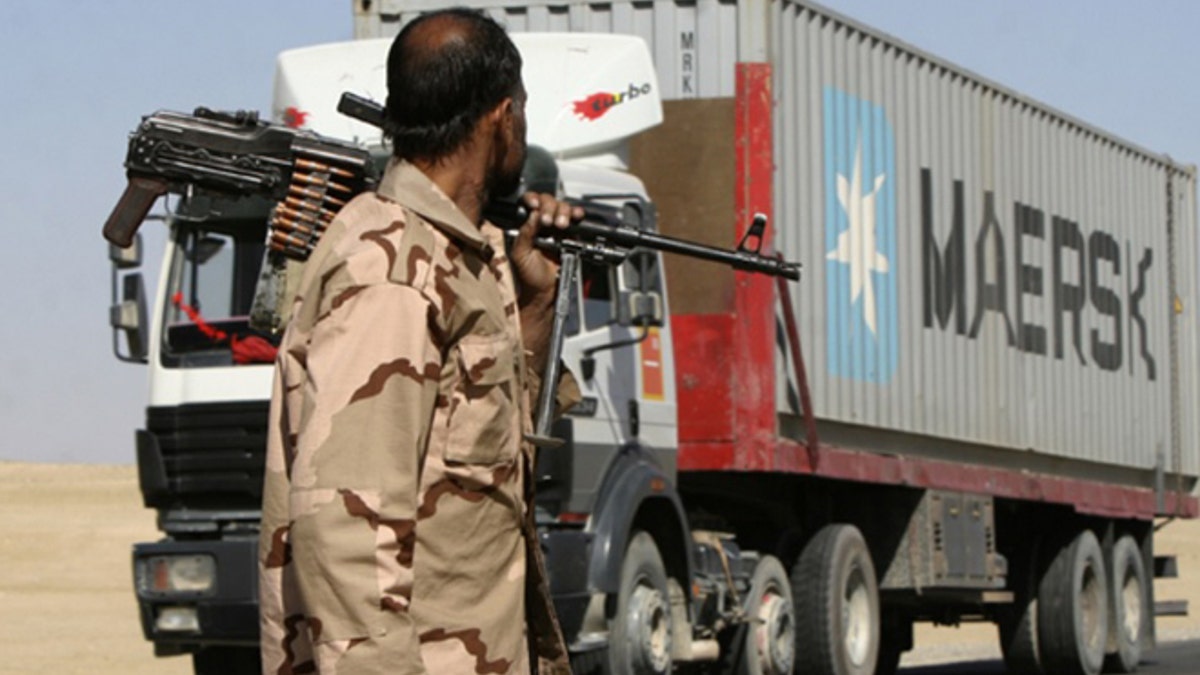
Many of Afghanistan's warlords provide protection to convoys along supply routes for a price. (Reuters)
American taxpayers have spent more than $100 billion rebuilding Afghanistan, creating schools, hospitals and roads while making millionaires out of a rogue's gallery of warlords, gangsters and corrupt officials.
A total of $114 billion, which does not include even more spent on the military effort to oust the Taliban and stabilize the impoverished country, has been appropriated since 2002. While it has likely improved conditions in the country, corrupt builders, security providers, mercenaries and even local bankers have all taken their cuts - and gotten rich in the process.
"Injecting tens of billions of dollars into a small country with insufficient oversight and flawed contracting practices created opportunities for the theft and embezzlement of foreign aid,” Special Inspector General for Afghanistan Reconstruction (SIGAR) John Sopko told FoxNews.com. “Our $114 billion investment in Afghanistan has been plagued by these criminal acts.”
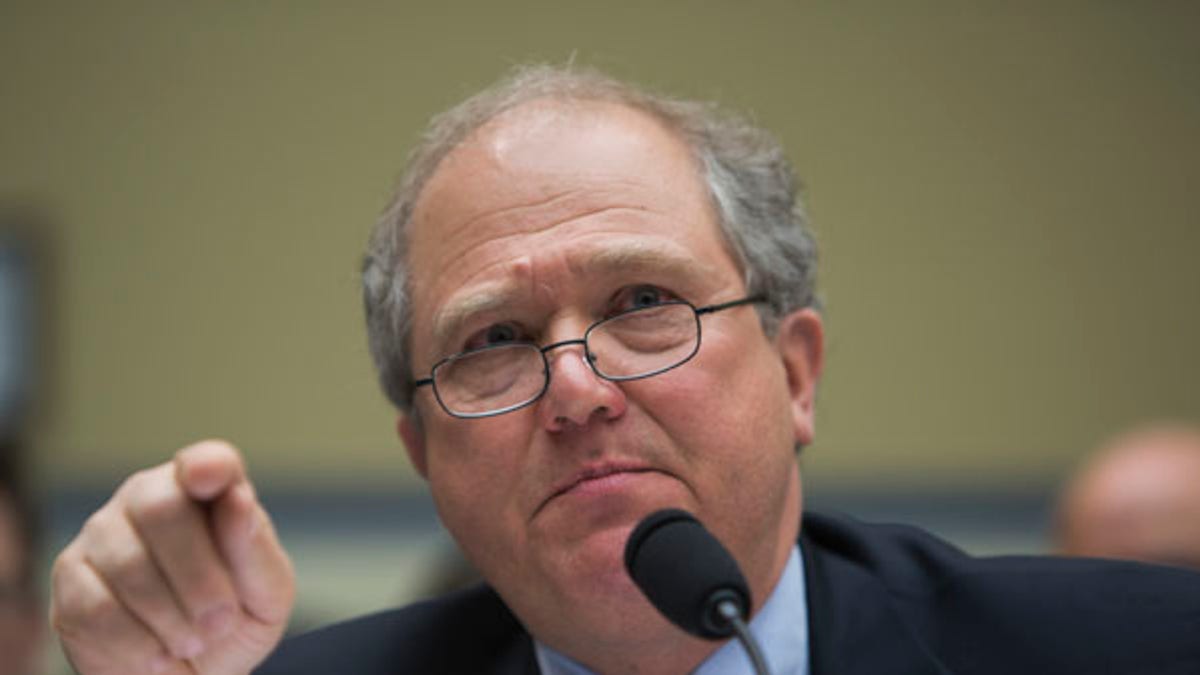
Special Inspector General for Afghanistan Reconstruction John Sopko has shined a spotlight on billions of U.S. tax dollars wasted in the region since taking the position in 2012. (SIGAR HQ)
Sopko's office is responsible for rooting out waste, fraud and corruption, and naming those in both Afghanistan and the U.S. who have had their hand in the cookie jar. Virtually every dollar spent has greedy hands grasping at it, according to Sopko.
Warlords and militia leaders who established and guard the U.S. supply chain work the system, and demand their percentage. According to a 2010 report entitled "Warlord, Inc.," from the Congressional Committee on Oversight and Government Reform, their methods involve providing “protection” along the supply routes for a fee, turning not-so-veiled threats into cold cash.
“The partial conversion of Afghan warlords into businessmen resembles in many ways the establishment of mafia networks, which are active both in the legal and the illegal economy and are able to use force to protect their interests and possibly to expand,” wrote Antonio Giustozzi, in a London School of Economics research paper entitled "Warlords into Businessmen: the Afghan Transition 2002-2005."
Ahmad Rateb Popal and his brother Rashid Popal, ex-cons and onetime jihadists, according to a 2009 Guardian article. run one of the largest security and risk management companies in Afghanistan. The brothers, reportedly cousins of former President Hamid Karzai, are former mujahedeen fighters who fled Afghanistan in the 1980s for the U.S., where they served prison time - in Ahmed's case, nine years for heroin smuggling, according to a 2014 report from Reuters which also reported that Popal had ties with the Taliban as a translator when they were in power.
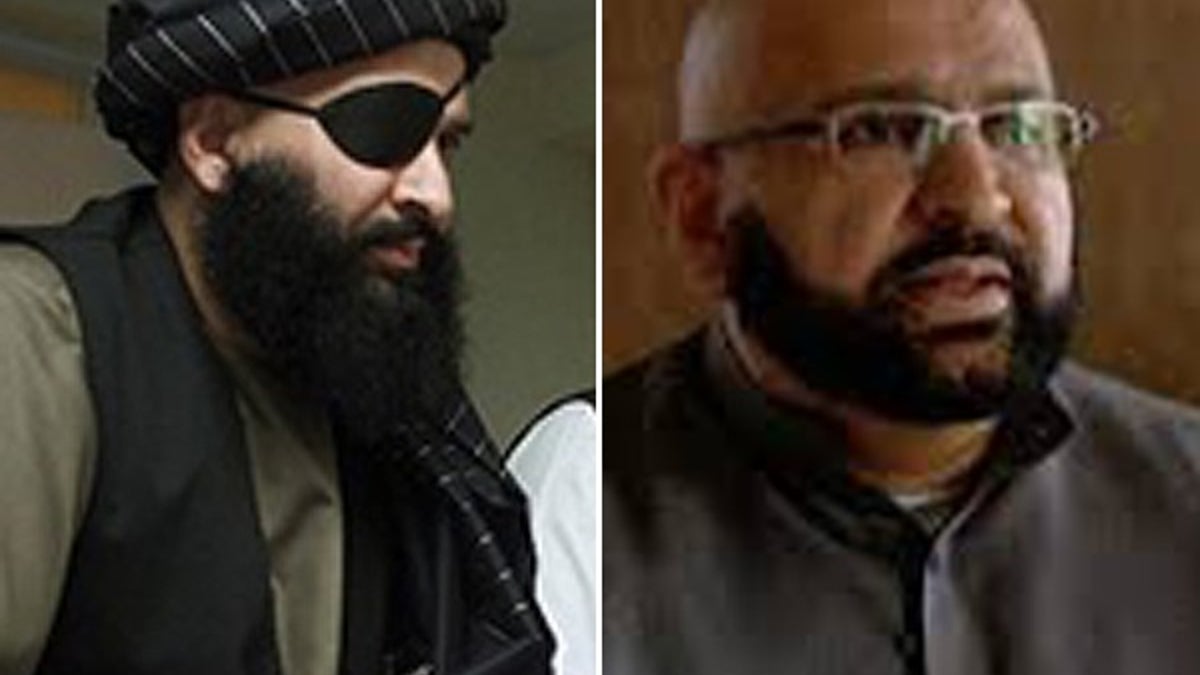
Ahmad Rateb Popal, at left during his time as a translator for the Taliban and at right, as head of the Watan Group. (RAWA.org/The Fix)
Fast forward to 2009 and Popal and his brother Rashid, became very wealthy heading up the Watan Group -- a telecommunications, logistics company and security company.
According to a 2009 article in The Nation, one of Watan’s major businesses was protecting convoys along the Kabul-Kandahar supply route of Highway 1, and it had a $360 million yearly contract - paid by the U.S. but doled out through the Karzai administration - to do it.
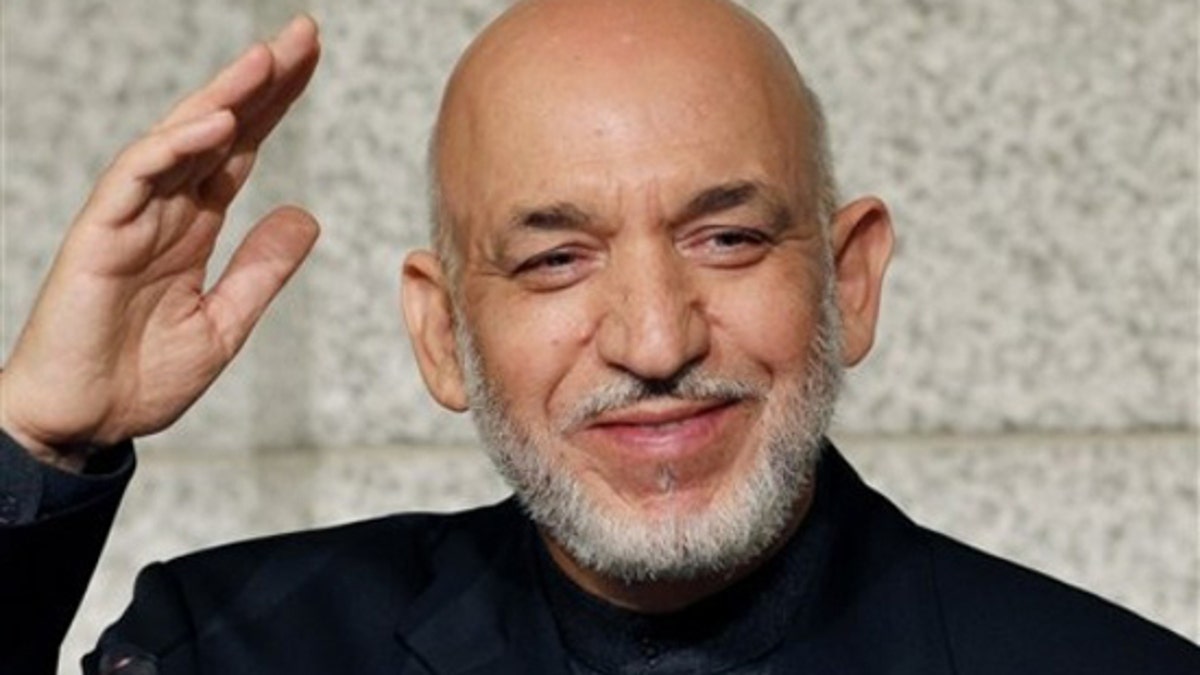
The Popal brothers are believed to be cousins of former Afghan President Hamid Karzai. (AP)
The exposé, which was also published by the Guardian, claims that the Watan Group paid an estimated 10 percent to the Taliban, the very group they were hired to guard against. Popal denied the allegations at the time, according to an article from the Canadian Broadcasting Corporation, adding that he did not receive contracts as a result of being a relative to Karzai.
The Watan Group has reportedly been able to control Highway 1 due to its relationship with Commander Ruhullah, a militia leader who has dominated the private security business along the main transportation route between the cities of Kabul and Kandahar, Highway 1, according to the "Warlord, Inc" report.
Ruhullah was virtually unknown in Afghanistan before September 2001, but over the next decade, he became the single largest security provider in the country. He commands a militia of about 600 armed guards and readily admitted to staffers from the House Subcommittee on National Security and Foreign Affairs that he has bribed governors, police chiefs and army generals. Locals reportedly refer to him as “The Butcher.”
Ruhullah told the Subcommittee staff that he guards about 3,500 U.S. supply trucks each month and that prime contractors and Afghan-based subcontractors pay $1,500 per truck for his services. The route he and his militia guard is vital, as most supplies from the U.S. are shipped to Bagram Airfield, north of Kabul, and most troops are in Kandahar to the south.
Despite his domination of security along this vital route, Ruhullah does not deal directly with the U.S. government, according to the Congressional report. Despite extensive regulation from the Defense of Department to improve oversight and accountability, Ruhullah brashly claims the U.S. rules do not apply to him, which was also noted in the "Warlord, Inc." report.
Others have worked their way into the Afghan central government to obtain wealth and power from the coffers of reconstruction efforts.
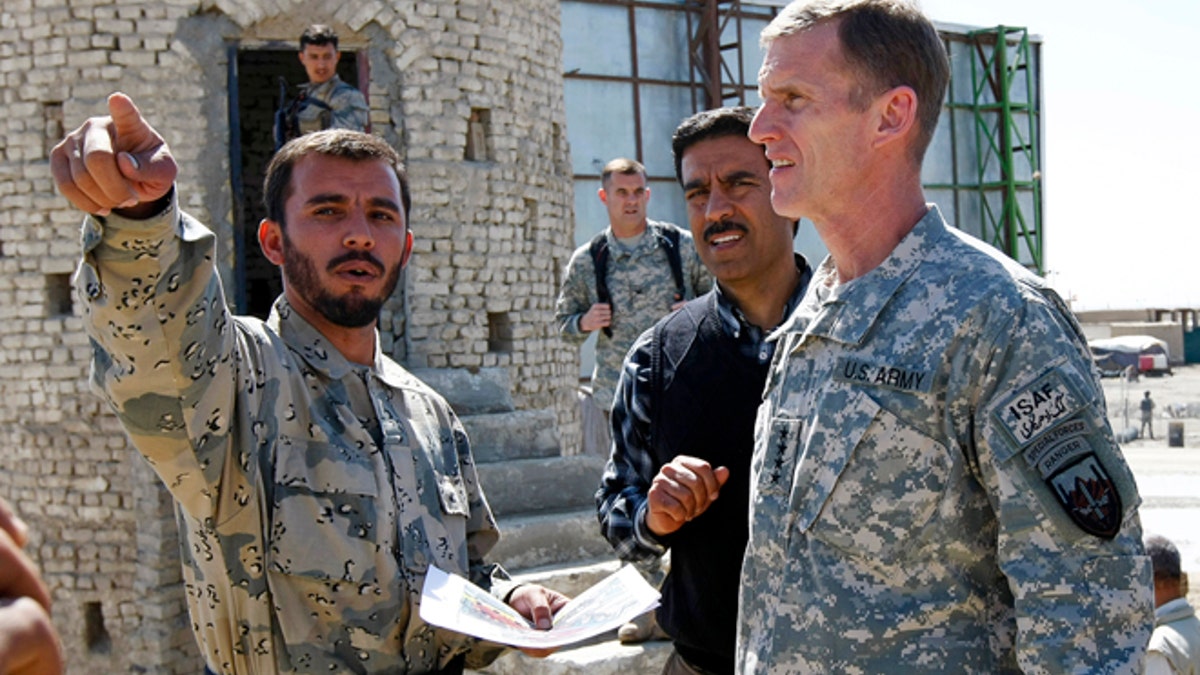
Warlord and Afghan border police Commander Colonel Abdul Razziq, seen here with General Stanley McChrystal in 2010, is believed to earn a major cut from all trucking that passes through the Spin Boldak region. (REUTERS/Peter Graff)
Commander Matiullah Khan positioned himself as the top warlord of the Uruzgan Province, which lies just north of Kandahar. The New York Times dubbed him the most powerful man in the province in a 2010 article.
“The most powerful man in this arid stretch of southern Afghanistan is not the provincial governor, nor the police chief, nor even the commander of the Afghan Army,” reads a line from the article. “It is Matiullah Khan, the head of a private army that earns millions of dollars guarding NATO supply convoys and fights Taliban insurgents alongside American Special Forces.” It’s believed that he was earning as much as $6 million per year on security for NATO convoys alone, according to the report.
While he often led the fight against insurgent forces, Khan was often questioned for his methods. Despite being the nephew of then governor of the province, he was notorious throughout Uruzgan for his alleged drug smuggling operation and human rights abuses, according to the New York Times. NATO forces in the area did their business with him at an arm's length, according to the 2010 Oversight Committee report.
"Although NATO forces stationed in Uruzgan are totally dependent on Matiullah to permit their supply convoys to travel the roads he controls, they publicly distance themselves from him," read the report.
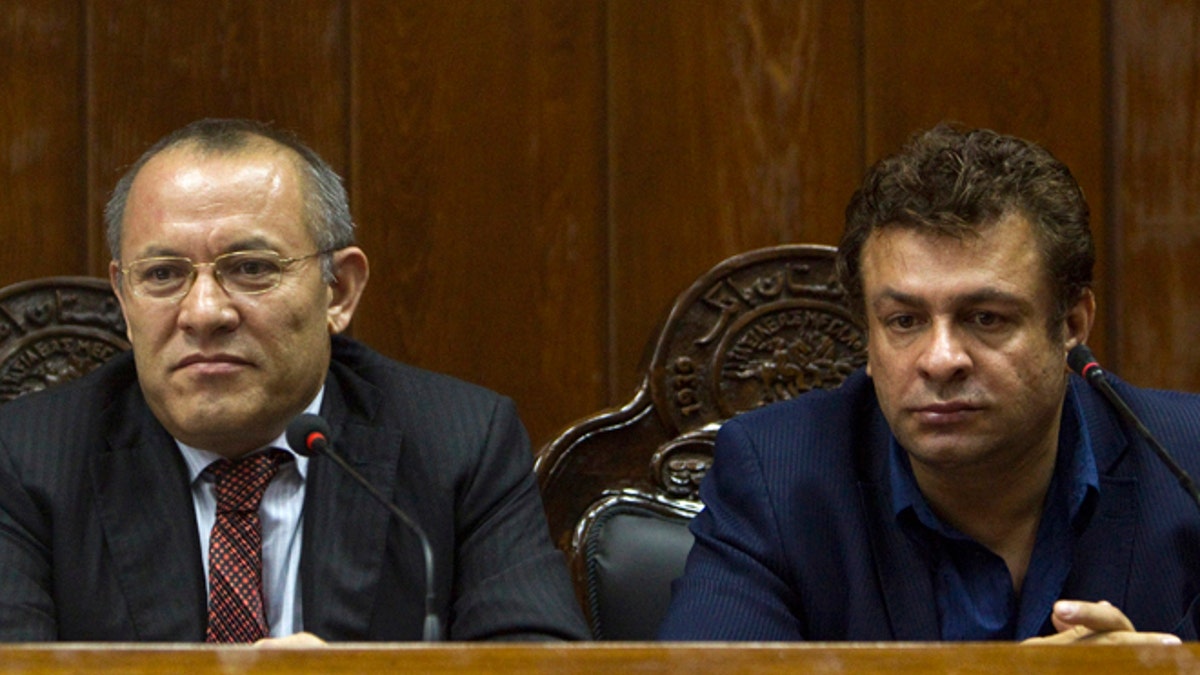
Kabul Bank Chairman Sherkhan Farnood (l.) and Kabul Bank CEO Khalilullah Ferozi, (r.), were among several charged with stealing $1 billion. (REUTERS/Ahmad Masood)
Khan continued to amass wealth as he rose from commander of a small militia to regional police chief before he was killed in a suicide bombing in Kabul in March of 2015.
Another warlord who has ascended into a position of power during reconstructions efforts is Col. Abdul Razziq. He controls the crucial Chaman-Spin Boldak border crossing with Pakistan in the southern Kandahar border. At the relatively young age of 30, Razziq became the chief of the Achakazi tribe while also being chief of staff for the provincial border police, according to the congressional report.
According to the Oversight Committee report, he gained control of the supply route and the region while being connected to a ferocious tribal militia and a gang of opium smugglers. Despite his shady dealings, Razziq continued to rake in a major cut from all trucking that passes through the border crossing. U.S. and NATO commanders have admitted that they aware of this but are still dependent on working with him because of his tight control on the border.
In January 2010, U.S. Army Gen. Stanley McChrystal met with Razziq in the Spin Boldak area to plead with him to increase traffic along the supply route to improve efficiency.
The warlords of Afghanistan are not the only ones who have employed questionable tactics to skim their cuts from reconstruction funds.
In March 2013, 21 employees and executives of the Kabul Bank were found guilty of fraud after it was discovered that Chairman Sherkhan Farnood and others spent $1 billion of the institution's money on lavish lifestyles for themselves and their families. Described as a Ponzi scheme, the scandal touched members of former Afghan President Hamid Karzi’s family, according to a 2013 New York Times article.
The bank, which was created after the war to pay the salaries of the army and security forces, reached its breaking point in September 2010, when one of the principal owners said that depositors had withdrawn $180 million over the course of two days and that the country’s financial system would be in complete upheaval unless the U.S. helped to stabilize the bank.
Two months later, Farnood and chief executive Khalilullah Frozi were fired. At the beginning of 2011, they were placed under house arrest until they were formally charged in July of that year. The central Bank of Afghanistan, which oversaw Kabul Bank, sought to sell the financial institution but after pressure from the International Monetary Fund and U.S. officials, the bank was wound down instead. A year after the government seized control of Kabul Bank, officials had recovered less than a tenth of the missing $1 billion.
Despite being convicted of fraud, Frozi was still a free man as of November 2015 and was still earning large sums of money, according to more recent report from The New York Times, when he signed the contract for a creation for a new township that boasted an initial investment of $95 million.
SIGAR has been trying to highlight the corruption and abuse in the reconstruction effort, and how it was allowed to happen under U.S. oversight.
Last month, Sopko released a report detailing the astronomical amount of post-war waste and how U.S. officials "turned a blind eye" to systemic corruption during rebuilding efforts.
“The U.S. government was forced to choose between maintaining a hard line against corruption or retreating in the face of the realization that fighting corruption would either require even more political capital than anticipated, or be largely futile in the absence of Afghan political will," the report stated.
"The U.S. government chose to do the latter.”
